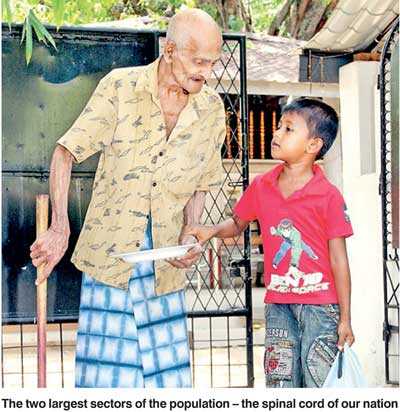Friday Feb 27, 2026
Friday Feb 27, 2026
Monday, 1 October 2018 00:00 - - {{hitsCtrl.values.hits}}

The International Day of Older Persons has been observed on 1 October each year since 1991. The focus of this year’s celebrations is the Universal Declaration of Human Rights (UDHR), as it turns 70 this year.
The 2018 theme’s main three goals are:
i. To reflect on progress and challenges in ensuring full and equal enjoyment of all human rights and fundamental freedoms by older persons;
ii. To reaffirm the commitment to the same by States and
iii. To engage broad audiences across the world and to mobilise people for human rights at all stages of life.
The Universal Children’s Day marks the anniversary of the date that the UN General Assembly adopted both the Declaration and the Convention on Children’s Rights (20 November) but the day is celebrated on various dates in different countries – 1 October in Sri Lanka.
It seems that, as these two important international dates coincide here, most of the focus is on children. Perhaps the rights of the older persons do not get the recognition they deserve.
Inherent human rights – their significance
Human rights are an indivisible, inter-dependent, universally agreed set of essential standards guaranteed to everyone automatically at birth without discrimination.
Full enjoyment of rights is indispensable for seniors and children for four main reasons.
To provide protection from other people who might want to harm, hurt, oppress or marginalise us;
To protect our inherent dignity and basic humanity;
To enable our participation in daily life as equal members of society;
To empower us to live with equality, freedom, justice and peace.
Freedom from discrimination and the right to equality, regardless of the varying degree of ability in day-to-day life, are two of the vital basic human rights.
As life is about access to what we need day-to-day, it is fundamental to living and a prerequisite to enjoy most other rights – right to education, right to safety of life, recreation and employment included.

Hence, States have a legal obligation and moral duty to take steps to enable everyone - seniors and children in particular – to truly enjoy the rights and fundamental freedom provided by the international conventions such as the UN’s Convention on the Rights of People with Disabilities (CRPD).
CRPD, which Sri Lanka ratified on 8 February 2016, where accessibility under article 9 is one of the 8 key pillars, is a legally binding agreement with comprehensive protection of the rights of persons with disabilities, and requires a commitment by each ratifying State for its implementation.
More important than pomp and pageantry
Time is pertinent to truly assess to what extent the expected and agreed rights of the two largest and important sectors of our population - elders and children, the life-giving spinal cord of our nation – are able to enjoy in the real world?
Large and increasing numbers of persons in Sri Lanka, estimated at not fewer than 20% of the population, experience impediments to physical mobility. These include seniors and those affected by numerous debilitating medical conditions, victims of accidents, and survivors of the war.
In fact, anyone could become mobility-limited at any time! We wonder how many of our top key decision-makers have realised this.
Rampant violations of rights in built environments
Sri Lanka enacted the Protection of the Rights of Persons with Disabilities Act No: 28 of 1996.
Clause 23(2) of this Act stipulates: “No person on the ground of disability, [shall] be subjected to any restriction with regard to access to or use of any building or place, which any other member of the public has access to or is entitled to use.”
The Ministry of Social Services has promulgated a comprehensive set of regulations, approved by the Parliament – Ref: Gazette No: 1,4657/15 dated October 17, 2006. These have been further enhanced by a landmark Supreme Court order under SCFR 221/2009, on 27 April 2011.
Over the past 12 years, in promoting the interests of seniors and children in particular, the Social Services Ministry and several of us have made valiant renewed efforts to implement and enforce these regulations properly.
Regretfully, the regulatory authorities have continuously failed, whether negligently or wilfully, to ensure compliance in full before issuing Certificates of Conformity. The construction companies circumvent the Court Order and obtain Certificates of Conformity in the absence of due compliance.
As a result, key parts of new buildings, especially toilets and wash facilities, steps and railings, signage, ramps and entrances, fail to comply with specifications and requirements stipulated by the laws.
The essential buildings and places recognised by the laws include hospitals, hotels, places of education and higher education, supermarkets and shopping complexes, ATM machines, sports stadiums, and a large number of office buildings, including those belonging to Ministries and Chief Ministers.
Turn letter of the law into reality
If this escalating current state of non-compliance is not arrested now, when Sri Lanka is embarking on numerous mega-development projects, what is certain to happen?
The next generations of seniors and children experiencing inevitable mobility impediments – the numbers of whom will be much greater than at present – will be alienated from freely accessing and using the facilities therein at a wide range of new buildings, and hence prevented from enjoying the next phase of Sri Lanka’s development.
If you remain inept and fail to bring constant pressure on decision-makers, the world around would marginalise you and discriminate against you beyond expectations, perhaps for life.
As fate is no respecter of persons and positions, tomorrow will be too late for you and your loved ones.
Lack of equal physical access means denial of most rights and loss of productive opportunities. Physical obstacles to access send a message of unwelcome, which is not good business thinking.
The quality of our life depends heavily on buildings and the built environment. Are they accommodating, safe and user-friendly? Not yet! How many children, adolescents and seniors continue to find access and safe use of the same facilities and opportunities their peers have in same society difficult?
We often see children and seniors with badly twisted ankles, broken arms or wrists, back aches, vertigo, or arthritis, unable to even negotiate steps without excruciating pain.
Just think how it must feel to be constantly in that plight, for a long time, for anyone of a hundred other causes – all due to poor design of parts of buildings which the public need to access and use in daily life.
Providing easier and safe modes of accessibility is a low cost feasible investment, with rich dividends for all, enabling everyone to be more productive and more independent.
All places of education, especially at all universities and the mushrooming number of institutes that offer internationally accepted degrees, must be made by the State to respect the right to education of all children, regardless of their varying mobility without discrimination, through complying with accessibility laws and especially the Supreme Court order given on 27 April 2011.
We are readier to offer sympathy and a helping hand, than empathy for empowering these people to enjoy even the basic rights with dignity. Perhaps many of you can take swift action, whereas I can only use words.
As many seniors, children and adolescents are still continually discriminated against and marginalised from so many daily needs and activities – economic, social and cultural – through no fault of their own, but based on their state of disability, then something is disastrously wrong. The world measures a civilised society by its inclusiveness towards all its citizens. In this respect, Sri Lanka unfortunately still lags behind several other developing nations.
(The writer, academically and professionally qualified voluntary activist, has pioneered since 1999, the campaign for ‘Accessible Sri Lanka for all through built environments’ – Please see goo.gl/tZZsmz)